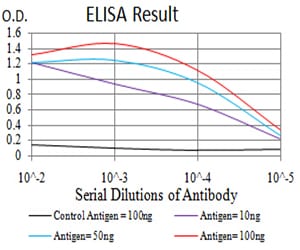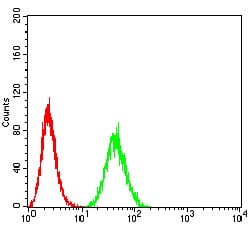

| WB | 咨询技术 | Human,Mouse,Rat |
| IF | 咨询技术 | Human,Mouse,Rat |
| IHC | 咨询技术 | Human,Mouse,Rat |
| ICC | 技术咨询 | Human,Mouse,Rat |
| FCM | 1/200 - 1/400 | Human,Mouse,Rat |
| Elisa | 1/10000 | Human,Mouse,Rat |
| Aliases | NK1; CD57; HNK1; LEU7; NK-1; GLCATP; GLCUATP |
| Entrez GeneID | 27087 |
| clone | 3B8C12 |
| WB Predicted band size | 38.2kDa |
| Host/Isotype | Mouse IgG1 |
| Antibody Type | Primary antibody |
| Storage | Store at 4°C short term. Aliquot and store at -20°C long term. Avoid freeze/thaw cycles. |
| Species Reactivity | Human |
| Immunogen | Purified recombinant fragment of human B3GAT1 (AA: 193-334) expressed in E. Coli. |
| Formulation | Purified antibody in PBS with 0.05% sodium azide |
+ +
以下是关于B3GAT1抗体的3篇参考文献的简要整理:
---
1. **文献名称**:*B3GAT1 modulates β1-integrin-mediated glioma invasion by regulating laminin-5 biosynthesis*
**作者**:Viapiano MS et al.
**摘要**:该研究利用B3GAT1抗体通过免疫印迹和免疫组化分析,发现B3GAT1通过调节层粘连蛋白-5的糖基化修饰,影响胶质瘤细胞的侵袭能力,提示其在肿瘤微环境中的关键作用。
2. **文献名称**:*Antibody-based profiling of B3GAT1 reveals its association with CD57 expression in NK cells*
**作者**:Nielsen JS, et al.
**摘要**:研究通过流式细胞术和免疫沉淀技术,结合B3GAT1抗体,证实B3GAT1与自然杀伤细胞(NK细胞)表面CD57的表达相关,可能参与免疫细胞的终末分化调控。
3. **文献名称**:*B3GAT1 deficiency disrupts corticospinal tract development via impaired HNK-1 biosynthesis*
**作者**:Yamamoto S, et al.
**摘要**:利用B3GAT1抗体在小鼠模型中检测发现,B3GAT1缺失导致HNK-1糖表位合成异常,进而影响皮质脊髓束的轴突导向,阐明其在神经系统发育中的分子机制。
---
注:以上内容为示例性概括,实际文献需通过学术数据库(如PubMed、Web of Science)检索获取全文。
The B3GAT1 antibody targets the β-1.3-glucuronyltransferase 1 (B3GAT1) protein, encoded by the B3GAT1 gene in humans. This enzyme, also known as GlcAT-I, plays a critical role in glycosaminoglycan (GAG) biosynthesis, particularly in the formation of the carbohydrate-protein linkage region of proteoglycans like heparan sulfate and chondroitin sulfate. These structures are essential for extracellular matrix organization, cell adhesion, and signaling. B3GAT1 catalyzes the transfer of glucuronic acid to a terminal galactose residue, a step required for subsequent modifications during GAG chain assembly.
B3GAT1 antibodies are widely used in research to study the expression, localization, and function of this enzyme in various biological contexts. They are employed in techniques such as Western blotting, immunohistochemistry, and immunofluorescence to detect B3GAT1 in tissues or cultured cells. Dysregulation of B3GAT1 has been implicated in neurological disorders, connective tissue diseases, and cancer metastasis, making these antibodies valuable tools for investigating disease mechanisms.
Commercially available B3GAT1 antibodies may vary in clonality (monoclonal/polyclonal), species reactivity (human, mouse, rat), and epitope specificity. Researchers often validate them using knockout controls or recombinant protein assays to ensure target specificity. Recent studies also explore B3GAT1's role in stem cell differentiation and viral entry mechanisms, highlighting its broader relevance in biomedicine. Proper antibody selection and optimization are crucial for accurate experimental outcomes in these applications.
×